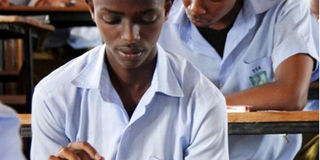Will end of term exams be missed?

Formative assessment scores will form part of the total learner score at the end of the cycle. FILE PHOTO
No beginning of term,midterm or end of term examinations but continuous assessments. This is the new rule in regard to assessing lower secondary students.
However, when the National Curriculum Development Centre (NCDC) announced that it was scrapping end of term examinations for lower secondary level early this month, it raised eyebrows across the education sector with some arguing that it was a wrong move while others appreciated it.
In Uganda, examination is big business. Apart from Uneb, Uganda has several examination boards especially at the district level whose main role is to offer external mock examinations at a fee to secondary schools. Meanwhile, more people are employed in printing, dissemination and selling examination papers to schools for end term, as well as holiday packages.
In its raft of measures, NCDC seeks to eliminate this chain of examination ‘brokers’ by establishing a continuous assessment in lower secondary level from senior one to four.
According to Christopher Muganga, the head of secondary curriculum at NCDC, if schools allow efficiency of the new assessment, then of holiday packages are not necessary.
While responding to what could happen to mock examinations and district examination boards, Muganga says: “Those have been areas where people are creating employment and getting money. It doesn’t add value to the learner.”
Muganga explains that teachers will assess students at the end of every topic, make an average and record it in the report card. He adds the assessments are largely practical in nature. He says this is aimed at doing away with reading-to-cram to-reproduce.
Educationists speak out
According to Ham Ahimbisibwe, the deputy head teacher at Mbarara High School in Mbarara District, there is no problem with the scrapping end of term exams as long as assessment goes on.
In fact, it is better to assess a student’s capacity along the way during the term, instead of subjecting them to an hour of examination to determine a student’s intelligence. He says,
“It helps a student to become active on a daily basis which is a better option. Holiday packages are as good as assignments. The whole idea of abolishing exams is to make sure assessment is continuous. It means every day; the learner is active and knows what he is doing because we assess step by step.”
However, Sr Gladys Kachope, the head teacher of Immaculate Heart Girls School in Rukungiri District differs from Ahimbisibwe with the theory that schools are likely to have academic indiscipline.
“We shall have a lot of academic indiscipline if students are not given end of term exams. It will also affect students’ performance and bring about lousiness and, when it comes to promotions, it will be a little bit difficult,” she remarks.
Kachope says that when students are preparing for end of term exams, the whole school is always at pressure and therefore there’s a likelihood of relaxing both on the side of students and teachers.
“Teachers and students are going to relax since there’s nothing like marking and summative assessments. It means we won’t have mock exams, and yet such exams are external and students tend to keep them busy without wasting time, and prepares them for Uneb exams,” she explains.
Charles Ondoga, headteacher, St. Joseph’s School Ombachi, Arua District says end of term assessment is very important and if they scrap exams, it may be hard to assess students well with the new assessment.
About the new assessment
According to Grace Baguma, the director at NCDC, the current teaching and assessment is examination driven focusing on acquiring a high grade pass as opposed to reasoning, critical analysis, understanding and acquisition of skills and knowledge.
Baguma says the formative assessment scores will form part of the total learner score at the end of the cycle. These have been agreed at 20 per cent for formative or school-based assessment and 80 per cent for the summative or end of cycle assessment.
The teacher is expected to observe the learner for any signs of acquired values, skills and change in attitude and take record of this in addition to assessing knowledge, understanding and skills. All these will be considered by the teacher during the learning process and reflected at compilation of the total formative assessment scores.
The marks will be captured throughout the four years averaged and computed into a score for each individual learner. There after the results will be submitted to Uneb for the overall grading of the learner.



